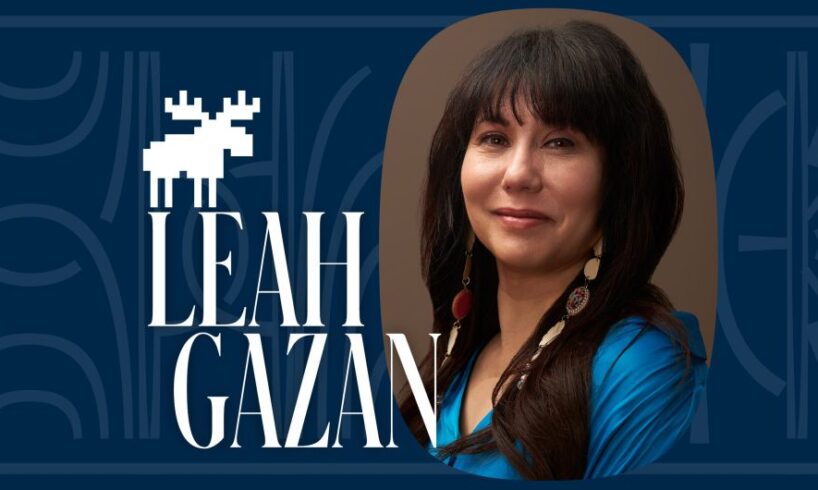
Leah Gazan, member of Parliament for Winnipeg Centre, is not one to back down without a fight.
Since her election to the House of Commons in 2019, Gazan has called out the federal government’s failure to stop the ongoing genocide against Missing and Murdered Indigenous Women, Girls and Two-Spirit people and urged the federal government to implement a Red Dress Alert system that would send Amber Alert-style notifications to surrounding areas when an Indigenous woman, girl or Two-Spirit person is abducted.
Last September, Gazan also tabled a bill that would criminalize residential school denialism. “If the government is serious about reconciliation, then they need to protect survivors and their families from hate,” Gazan, a member of Wood Mountain Lakota Nation and the descendant of Holocaust survivors, has said.
Gazan has hung onto her fearlessness — and her position — through three election cycles, and she’s only getting started. Her latest battle is against the federal government’s recently passed Bill C-5, one of several controversial environmental laws with a pentagonal moniker that has popped up since the April election.
So, how does a tough, tested MP connect with the natural world outside the House of Commons? Below, she shares the places (and plants) that keep her grounded, including the waterfalls at her favourite campsite.
This interview has been condensed and edited for length and clarity — all opinions are the subject’s own.
What’s the most awe-inspiring natural sight you’ve witnessed between the Pacific, Atlantic, 49th parallel and Hudson Bay, i.e. Canada?
I love road trips and I’ve travelled by car from coast to coast. The drive along the St. Lawrence is spectacular, but going west through the mountains is just such a miracle to see mountains like that, especially coming from the Prairies.
But then the Prairies have their own kind of secret beauty that nobody talks about. Like my community of Wood Mountain Lakota Nation in Saskatchewan is actually a valley, and it’s really hilly. Everybody thinks Saskatchewan is totally flat, but if you go into the Cypress Hills, it’s almost desert-like in the fall, and there’s cacti that actually grow out of the mountain tops. It’s so quiet and it has this very rich history. That’s where, for example, Sitting Bull had his last sun dance before he was slaughtered by the American army at the time. You can feel that energy, but it’s also so beautiful. So I have to say my nation.
What is the most awe-inspiring natural site you’ve seen outside of Canada?
Well, I’ve been all over the world, and I think I would say Greece. It was so long ago I think there were still dinosaurs and palm trees, but I drove around Greek islands like Santorini around that area on a dirt bike, and the water is so blue and all the buildings are white, and it was just breathtaking. I was lucky. I went before it was a touristy place. I stayed in a place right by the beach, and it was $8 a night. That’s how old I am.
Think of three iconic Canadian animals and choose one each to kiss, marry and kill.
Okay, so iconic is my dog — my little Yorkie, Miss Lily. And I kiss her every day, and she’s iconic. She travels with me everywhere and she’s never without me for more than a couple of hours. She’s 18 and she’s still in good shape.
I’m not really a killer, but I do like fish. I would say a fish. How about a walleye? Because I killed a walleye once. That’s the only animal I’ve ever killed. I actually caught a walleye, and I had deep pain about killing the walleye. It was tough, but I did eat it. I killed it and I ate it.
To marry — I think a horse, because there’s a companionship. You can travel together. But Miss Lily, that’s the one I would kiss, for sure.
Manitoba MP Leah Gazan has an iconic 18-year-old Yorkie, Miss Lily. Photo: Supplied by the office of Leah Gazan.
Name a person or a group doing something meaningful for the environment that you think everyone should know about.
Not necessarily a group, but frontline climate champions. There’s just so many organizations, but one that has been really good, in terms of having an intersectional lens with Indigenous Rights, is Manitoba’s Climate Action Team.
Who is a person or group you think could help mitigate the climate crisis if they really wanted to?
I don’t think it’s beholden on one person. I’m a long-time climate activist, I’m a member of Parliament, and I think it’s beholden on all of us that make decisions — that are making laws. We just saw Prime Minister Mark Carney pass Bill C-5 that weakens environmental assessment, and the Conservatives voted along with them.
You know, I’m 53 and I’ve seen in my lifetime the impacts of the climate emergency, but it’s younger people that are really going to have to deal with the crisis, and their voices and Indigenous Peoples who are on the frontline of the climate emergency, often in these decisions, are excluded. So I think it is irresponsible at this point to pass any laws without centering the importance of protecting the environment.
Outdoor cats. Yes or no?
Yes, because that’s who they are. How tragic it would be to be a cat and never go outside, right? They need to be their true selves, living their best lives.
Tell us about a time that you changed your mind about something environmental or otherwise.
I’ve never changed my mind — I’m always right. Just kidding.
I was in the 80s generation — you’d get a lunch and you threw everything out, and that was the best lunch. We got rid of Tupperware. We just contaminated the Earth. I’ve changed my mind about a lot of my understanding around this kind of waste culture. Whether it’s food or things that we need, we need to be more conscious in everything we do. You know, making sure that we’re recycling all the time, not having any food waste. I’ve grown from the 80s to now. Thinking back when I was a kid, the best lunches were the juice boxes, right? And now I look at that and I just think it’s a dumpster fire for the Earth.
And what about a time you’ve tried to change someone else’s mind about something environmental or otherwise?
Now that I’m older, to be honest, it’s less about trying to change people’s minds as it is about trying to understand where people are at and try to bring them along. Like, I sit in the House of Commons where some elected officials are climate denialists, and some people you can’t convince for whatever reason. I try to understand where that belief comes from, particularly opposing beliefs that are based in science, and then ask questions that allow people to think and then come along. I think it’s about listening more attentively, actively figuring out where people are at and trying to bring them along.
Rocky Mountains, or Great Lakes?
Great Lakes. I love water. I love the sound of water, and I love the forest.
Researchers at Yale University, the France-based Women’s Forum for the Economy and Society and other institutions have found women tend to be more concerned about climate change than men. Why do you think that is?
Well, if I look at our traditional teachings, as an Indigenous person, we refer to the Earth as our mother and our life-giver. For people who identify as a life-giver, I think there’s that natural connection, because Earth is life-giving, and you have to nurture that life for your own survival. And I think there’s that natural connection, yeah.
If you could dip a toe off Canada’s coastline, which ocean would it be in?
Pacific. I just haven’t been in that part of the Earth for a while.
What’s a beautiful or useful thing you’ve owned for a really long time?
I have a plant obsession. I live in a condo, and I have more than 50 plants. I’ve had my mom’s plant for about over 20 years and it’s still living. In fact, I’m on my way to the store to get more soil, because I replanted it a little bit today. Can you believe that plant’s been alive for over 20 years?
It’s a pothos, one of those hanging plants. It almost died, and then I brought it back to life. I cut off stems, and I stuck them in water, and I let it grow tons of roots and then replanted it. Now it has a plant baby because I have a separate plant that I’ve grown with my mom’s plant. So new generations — a multi-generational pothos plant.
What is the farthest north that you’ve ever been? And what did you do there?
The Yukon and I visited my sister. I love the Yukon — it’s so beautiful. But I had to sleep in the basement because it was summertime and the sun was out all the time. I had to sleep with light covers on my window so I could sleep at night. It’s really disorienting.
If you could ask one person alive or dead their thoughts on climate change, who would it be?
My mom. She was a really wise, thoughtful person.
What’s one way that you interact with the natural world on a daily basis?
With my plants, I know when they’ve grown a leaf. I keep that kind of close eye on my plants as it connects me with the Earth, especially in an urban environment. I go for walks and stuff like that, but it’s not like life-giving. My plants are life-giving in an urban jungle.
I talk to my plants. I say, ‘Hello, little plant. I see you growing a leaf.’ I think they feel your energy because it’s a life form. I feel devastated when somebody cuts a tree down because it’s like, how long did it take for them to grow and then you cut it down? People don’t see it as life.
Smoked salmon, or maple syrup?
Smoked salmon. No, I take it back — maple syrup because you can make sweet smoked salmon with maple syrup. I make the best chili with maple syrup and cakes — maple syrup is more versatile than smoked salmon.
Who in your life has had the greatest impact on your connection to nature?
My partner Romeo, because he was born in the boreal forest.
And whose relationship to nature would you like to have an impact on?
My son, because he grew up in the city, and I feel like he needs to spend time on the land, in the bush — away from an urban environment.
Camping, yes or no?
Yes. My favourite camping spot close to my house is Rushing River or Sioux Lookout in northern Ontario. I like Sioux Lookout because it’s quiet. It’s not that touristy. It’s not that busy. And I like Rushing River because I like the falls there, and I have good memories from when I was young, like going down the falls and camping with friends. It was fun. I probably wouldn’t do it now, because I’d be worried that I would break my bones or something.
Would you rather be invited to Victoria and David Beckham’s Muskoka cottage, or Harry and Meghan Sussex’s B.C. escape?
Neither. But if I had to, I would say David Beckham and Victoria. At least we could talk about soccer. I’m not a monarchist.
Enjoying the Moose Questionnaire? Read more from the series here.





